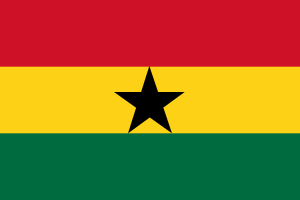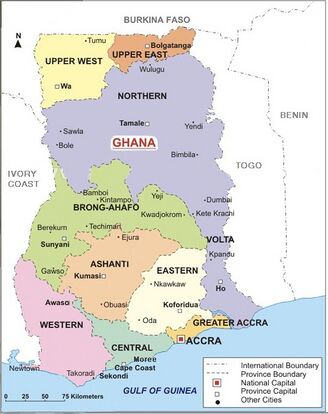Scouting and Guiding in Ghana: Difference between revisions
No edit summary |
No edit summary |
||
| Line 2: | Line 2: | ||
== '''Scouting Organizations in Ghana''' == | == '''Scouting Organizations in Ghana''' == | ||
=== National Associations === | |||
The '''[[Scouting|Scout]] and [[Girl Guides|Guide]] movement in Ghana''' is served by: | The '''[[Scouting|Scout]] and [[Girl Guides|Guide]] movement in Ghana''' is served by: | ||
* [[The Ghana Scout Association]], member of the [[World Organization of the Scout Movement]] | |||
* [[The Ghana Girl Guides Association]], member of the [[World Association of Girl Guides and Girl Scouts]] | * [[The Ghana Girl Guides Association]], member of the [[World Association of Girl Guides and Girl Scouts]] | ||
=== International Associations === | |||
* The [[Baden-Powell Scouts' Association]], member of the [[World Federation of Independent Scouts]] | * The [[Baden-Powell Scouts' Association]], member of the [[World Federation of Independent Scouts]] | ||
* In addition, there are American Boy Scouts in Accra, linked to the [[Direct Service]] branch of the [[Boy Scouts of America]], which supports units around the world. | * In addition, there are American Boy Scouts in Accra, linked to the [[Direct Service]] branch of the [[Boy Scouts of America]], which supports units around the world. | ||
* [[Vanguard Scouting]] - International support group for Latter-day Saints scouting in Ghana. | |||
== '''History of Scouting in Ghana''' == | == '''History of Scouting in Ghana''' == | ||
Revision as of 17:26, 13 December 2020
Scouting Organizations in Ghana
National Associations
The Scout and Guide movement in Ghana is served by:
- The Ghana Scout Association, member of the World Organization of the Scout Movement
- The Ghana Girl Guides Association, member of the World Association of Girl Guides and Girl Scouts
International Associations
- The Baden-Powell Scouts' Association, member of the World Federation of Independent Scouts
- In addition, there are American Boy Scouts in Accra, linked to the Direct Service branch of the Boy Scouts of America, which supports units around the world.
- Vanguard Scouting - International support group for Latter-day Saints scouting in Ghana.
History of Scouting in Ghana
Scouting first came to Ghana in the year 1911 by Samuel Wood of Cape Coast. He was born on 17th January 1886 .When he was a young man, Samuel Wood won a drawing contest which was sponsored by an English newspaper, THE SHEFFIELD WEEKLY.
Ghana National Overview
Ghana (/ˈɡɑːnə/), officially the Republic of Ghana, is a country located along the Gulf of Guinea and Atlantic Ocean, in the subregion of West Africa. Spanning a land mass of 238,535 km2 (92,099 sq mi), Ghana is bordered by the Ivory Coast in the west, Burkina Faso in the north, Togo in the east and the Gulf of Guinea and Atlantic Ocean in the south. Ghana means "Warrior King" in the Soninke language.[1]
The first permanent state in the territory of present-day Ghana dates back to the 11th century. Numerous kingdoms and empires emerged over the centuries, of which the most powerful was the Kingdom of Ashanti. Beginning in the 15th century, numerous European powers contested the area for trading rights, with the British ultimately establishing control of the coast by the late 19th century. Following over a century of native resistance, Ghana's current borders were established by the 1900s as the British Gold Coast. It became independent of the United Kingdom on 6 March 1957.
Ghana's population of approximately 28 million spans a variety of ethnic, linguistic and religious groups. According to the 2010 census, 71.2% of the population was Christian, 17.6% was Muslim, and 5.2% practiced traditional faiths. Its diverse geography and ecology ranges from coastal savannahs to tropical rain forests.
Ghana is a unitary constitutional democracy led by a president who is both head of state and head of the government. Ghana's growing economic prosperity and democratic political system have made it a regional power in West Africa. It is a member of the Non-Aligned Movement, the African Union, the Economic Community of West African States (ECOWAS), Group of 24 (G24) and the Commonwealth of Nations.
Local History
Various African tribes resided in Ghana for thousands of years. Akan peoples settled Ghana in the 13th century and ruled the region when the first Europeans explored the area. The Portuguese and Dutch established small coastal towns and forts to exploit gold resources. The British later arrived, naming western Ghana the Gold Coast. The Gold Coast was a British colony from the late nineteenth century until independence in 1957. Eastern Ghana was first colonized by the Germans and later administered by the British as a separate colony named British Togoland following the division of the former German colony between the British the French during World War I.
Greater independence movements began in the mid-1950s. Although a series of coups occurred following independence in the 1960s and 1970s, economic growth and stability returned during the presidency of Jerry Rawlings. Unlike most African nations, Ghana experienced little ethnic tension and a slow transition to a democratic government during President Rawlings rule. Ghana retruned to democracy with democratic elections in the 1990s. Ghana has been praised as one of the greatest successes in political stability and democratization in West Africa.
Culture
The population exhibits considerable ethnic diversity, with each ethnic group possessing some unique cultural characteristics. Christianity is the primary influence on society in southern and coastal areas whereas Islam is the dominant influence on society in the north. Sports are popular, especially soccer. Music, textiles, and dance occupy an important role in culture. Polygamy is illegal, yet practiced among some according to local custom and Sharia law. Cocaine and marijuana use appears higher than most nations.
Religious Freedom
The constitution protects religious freedom which is upheld by government. No restrictions prohibit proselytism and government respects religious minority groups. Major Christian and Muslim holidays are recognized national holidays. Religious groups are required to register and there have been no recent instances of the government refusing to register a religious group. The government has taken steps to foster harmony and tolerance between differing religious groups. Societal abuse of religious freedom occurs at times and targets practioners of indigenous faiths and Muslims.
Language
English is the official language. Additionally, there are eleven languages that have the status of government-sponsored languages:[2]
- Ga
- four Akan languages (Asante Twi, Akuapem Twi, Fante and Nzema) - Akan is the most widely spoken.
- two Mole-Dagbani ethnic languages (Dagaare and Dagbanli)
- Ewe
- Dangme
- Guan
- Kasem
Since Ghana is surrounded by French-speaking countries, French is widely taught in schools and universities, as well as a language used for commercial and international economic exchanges.
Resources
- Scouts Day Ghana - YouTube Feature
References

